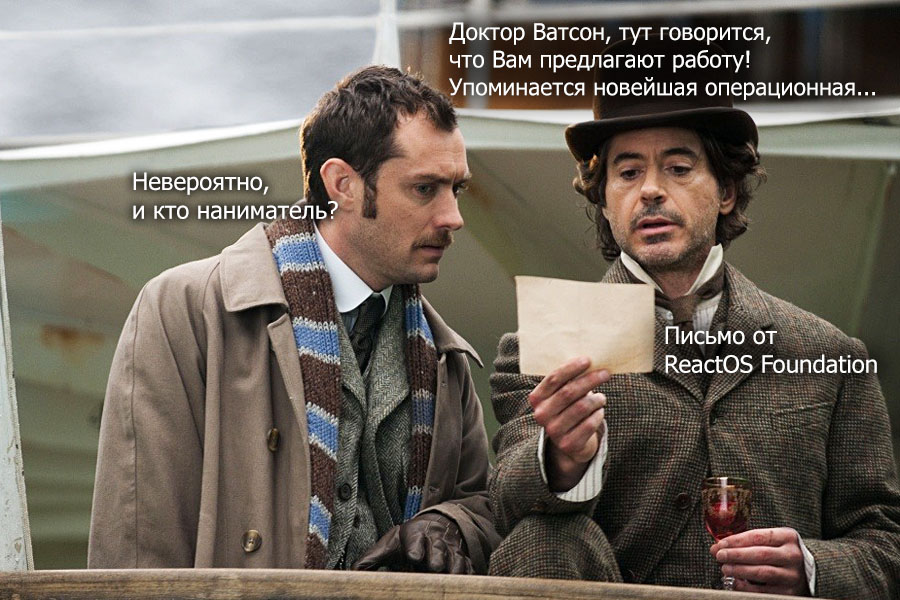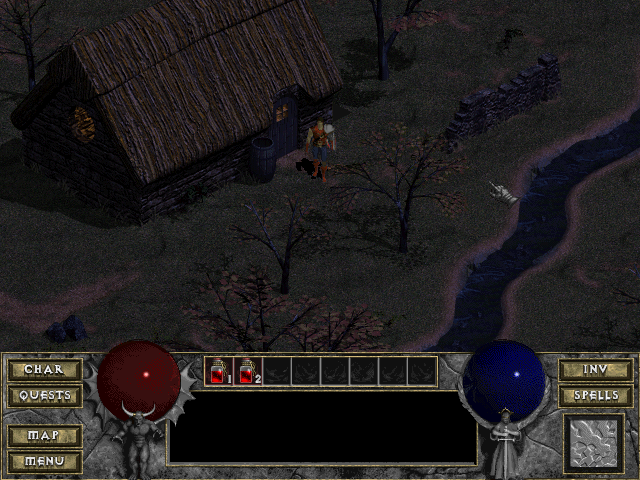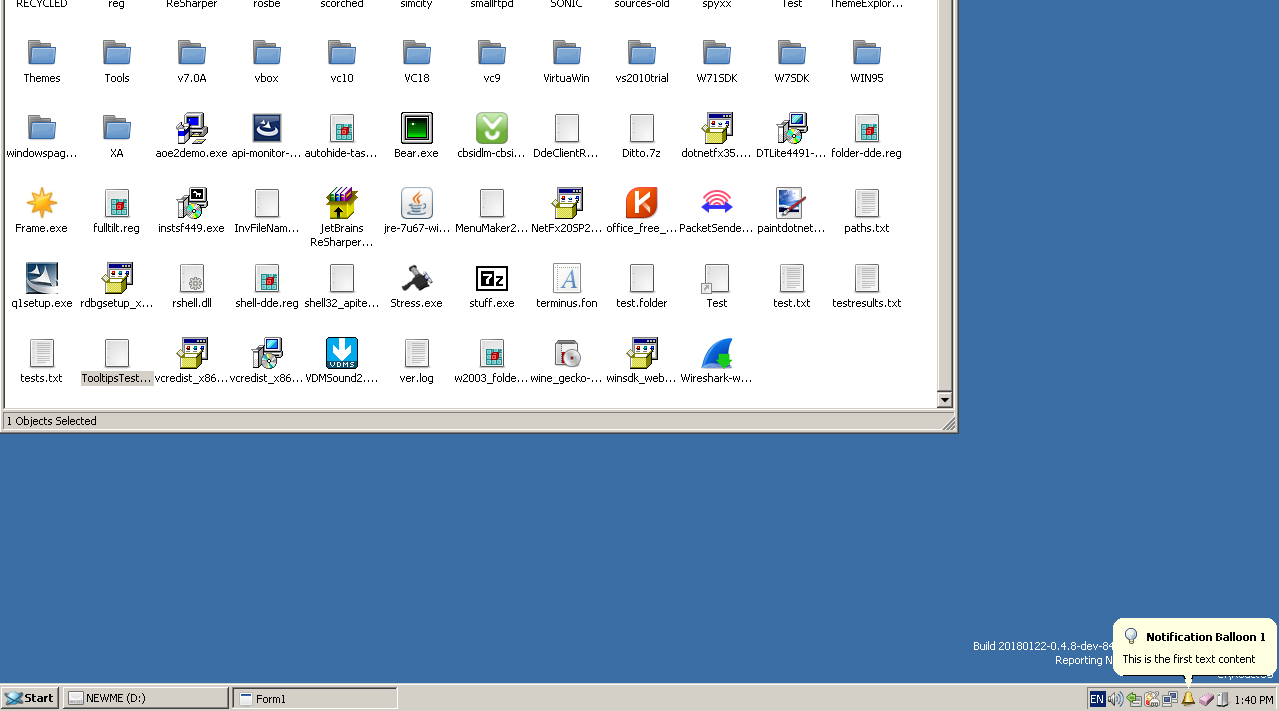ReactOS 0.4.8: We lured Dr. Watson
Hi, Habr! At the time of the battle of the dough against evil , we announce the release of the next version of our operating system. Coincidence? We do not think!
In this release - support for new APIs, the return of Dr. Watson, bugs with fantastic stories.

')
Download installation images | Press release | List of changes | TL; DR | Tests and regression list
So let's start with the main thing! It was in release 0.4.8 that the experimental ability to launch applications written for the NT6 + platform (Vista, Windows 7, 8, 10) was officially activated for the first time. Support is implemented by further developing a special layer to ensure compatibility and making additional changes to Kernel32, NTDLL and LDR, including the mechanism of changing the root manifest and masking the accessibility of the API. Of course, you can hardly run the fancy programs, but the list of supported applications has expanded significantly!
And we also want to reveal a small big secret that in the near future (we hope) the project will begin production of workable 64 – bit operating system assemblies.

From this point on, the distribution kit includes a tool similar to DrWatson32 , which allows, in case of an application crash, to save the file with the status log to the desktop. The log contains data useful for diagnosing critical errors, such as lists of loaded modules and threads, stack traces, dumps, and information about the status of registers. This will make it easier for testers to send bug reports of critical application crashes.

Pierre Schweitzer eliminated several problems in the Common Cache cache management system (one of the found and eliminated bugs was already introduced 17 years ago) and the Freeloader loader, which made it possible to re-enable booting on systems with 96 Mb of RAM.
Also in the management system, Pierre’s cache added support for Read Ahead and Lazy Writing.
Problems with initialization were solved in some games, manifested when using native graphics drivers. Also eliminated color distortions in applications using DirectX.

Virtual CD-ROM and floppy-disk drivers are added to the basic delivery. Finally, the problems that prevented ReactOS from booting on very old hardware and in virtual machines with an empty floppy drive connected, were eliminated.
The CDFS driver (CD – ROM file system) was replaced with the original implementation from Microsoft, the code of which was opened under the MS – PL license. During the review, a unique case occurred - the ReactOS developers found an error in the Microsoft code and sent a fix. Now the ReactOS code will be in the Microsoft code .
A new NTFS driver has been added with initial write support (recording support is still flawed, but can be enabled through the registry for testing). The development of this driver was also started by Pierre Schweizer, and the recording functionality was created by Trevor Thompson during the two summer seasons of the GSoC 2016 and 2017 .
Various improvements have been made to the Explorer shell — auto-hiding and locking the taskbar, notifying the system tray, monitoring the icons of active applications in the system tray; debugging and renaming folders, highlighting multiple files on the desktop.

As usual, it synchronized with the recent Wine 3.0 codebase and updated versions of third-party components: Freetype 2.9, Ext2 0.69, uniata v0.46e5, libxml2 2.9.7, libmpg123 1.25.8, libtiff 4.0.9, libxslt 1.1.32, libjpeg 9c, libpng 1.6.34.
A few screenshots from Twitter:
1.Orgasm perfectionist
2. Run on real hardware
3. Japanese Experience and Otter Browser
For a snack, Vadim Galyant prepared experimental builds of distributions with an updated USB stack.
We are waiting for your impressions and bug reports, friends! Also do not forget that you can help the project by simply placing an asterisk on the githaba !
In this release - support for new APIs, the return of Dr. Watson, bugs with fantastic stories.

')
Download installation images | Press release | List of changes | TL; DR | Tests and regression list
So let's start with the main thing! It was in release 0.4.8 that the experimental ability to launch applications written for the NT6 + platform (Vista, Windows 7, 8, 10) was officially activated for the first time. Support is implemented by further developing a special layer to ensure compatibility and making additional changes to Kernel32, NTDLL and LDR, including the mechanism of changing the root manifest and masking the accessibility of the API. Of course, you can hardly run the fancy programs, but the list of supported applications has expanded significantly!
And we also want to reveal a small big secret that in the near future (we hope) the project will begin production of workable 64 – bit operating system assemblies.

From this point on, the distribution kit includes a tool similar to DrWatson32 , which allows, in case of an application crash, to save the file with the status log to the desktop. The log contains data useful for diagnosing critical errors, such as lists of loaded modules and threads, stack traces, dumps, and information about the status of registers. This will make it easier for testers to send bug reports of critical application crashes.

Pierre Schweitzer eliminated several problems in the Common Cache cache management system (one of the found and eliminated bugs was already introduced 17 years ago) and the Freeloader loader, which made it possible to re-enable booting on systems with 96 Mb of RAM.
Also in the management system, Pierre’s cache added support for Read Ahead and Lazy Writing.
Problems with initialization were solved in some games, manifested when using native graphics drivers. Also eliminated color distortions in applications using DirectX.

Virtual CD-ROM and floppy-disk drivers are added to the basic delivery. Finally, the problems that prevented ReactOS from booting on very old hardware and in virtual machines with an empty floppy drive connected, were eliminated.
The CDFS driver (CD – ROM file system) was replaced with the original implementation from Microsoft, the code of which was opened under the MS – PL license. During the review, a unique case occurred - the ReactOS developers found an error in the Microsoft code and sent a fix. Now the ReactOS code will be in the Microsoft code .
A new NTFS driver has been added with initial write support (recording support is still flawed, but can be enabled through the registry for testing). The development of this driver was also started by Pierre Schweizer, and the recording functionality was created by Trevor Thompson during the two summer seasons of the GSoC 2016 and 2017 .
Various improvements have been made to the Explorer shell — auto-hiding and locking the taskbar, notifying the system tray, monitoring the icons of active applications in the system tray; debugging and renaming folders, highlighting multiple files on the desktop.

As usual, it synchronized with the recent Wine 3.0 codebase and updated versions of third-party components: Freetype 2.9, Ext2 0.69, uniata v0.46e5, libxml2 2.9.7, libmpg123 1.25.8, libtiff 4.0.9, libxslt 1.1.32, libjpeg 9c, libpng 1.6.34.
A few screenshots from Twitter:
1.Orgasm perfectionist
2. Run on real hardware
3. Japanese Experience and Otter Browser
For a snack, Vadim Galyant prepared experimental builds of distributions with an updated USB stack.
We are waiting for your impressions and bug reports, friends! Also do not forget that you can help the project by simply placing an asterisk on the githaba !
Source: https://habr.com/ru/post/353784/
All Articles